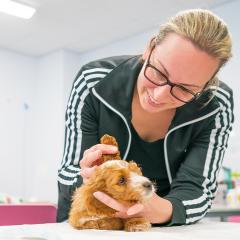Become a Veterinary Nurse with EDC
Being a veterinary nurse can be a very challenging job, often involving long and unsociable hours, however the rewards that come from nursing a sick animal back to health make it a very fulfilling job too.
Based at our Houghall Campus, in Durham, at level 2 you study topics such as animal handling and restraint, health, hygiene and disease, animal emergencies and first aid, veterinary terminology, veterinary anaesthesia, medication, radiography, employment issues and health and safety in a veterinary practice.
Before we get a bit more into the course, take a look at what it's all about with our video below.
Starting The Veterinary Nursing Course
For both our Level 2 and Level 3 veterinary nursing programmes, it is essential that you have secured a placement in a veterinary practice before starting the course. If you are unable to do so before starting with us, we may be able to offer you a place on our animal care pathway instead.
Level 2 Veterinary Care Assistant
Applicants to the level 2 programme must be 16 years old and have achieved maths and English GSCEs at grade 3 or higher. To be accepted on to this course you will be required to have a placement in a RCVS approved veterinary practice for a minimum of two days per week for one year.
Level 3 Veterinary Nursing
For the level 3 programme applicants need to have a block release placement, working 40 hours per week during their practice placement time.
At level 3 topics include anaesthesia, radiography, diagnostic imaging, medicines, pre and post-operative care, veterinary emergencies, animal welfare, functional anatomy and professional relationships within veterinary practice.
For level 3 applicants MUST be at least 17 years old on 31st August due to legislation covering the X-ray equipment used as part of the course.
Candidates must possess a minimum of five GCSEs at grades 4-9, including maths, English and science. Alternatively, they could progress with an overall distinction grade in the level 2 veterinary care programme including successfully passing GCSE maths and English. In addition, students must also have at least six weeks work experience within a veterinary practice prior to commencing the course.
For the level 3 programme applicants MUST have secured employment or a voluntary placement in a RCVS approved practice. The voluntary placement could also be adapted to run as an apprenticeship. Students study at college and take part in a block release placement scheme. These placements run five days a week, and blocks vary from 3 to 9 weeks throughout the two academic years of the programme.








